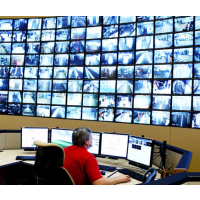New Public Data Collection Technology Increases Security and Efficiency, Reduces Privacy
 NY/NJ Port Command Center operates 192 surveillance monitors (AP photo)
NY/NJ Port Command Center operates 192 surveillance monitors (AP photo)
New techniques in data collection have made surveillance on average citizens as easy as flipping a light switch.
As part of its work on Terminal B of Newark Liberty International Airport, The Port Authority of New York & New Jersey had 171 LED light fixtures installed. But those fixtures do more than light the way to your gate. They’re also part of a network that includes cameras and sensors that monitor activity in the airport, according to The New York Times.
The airport’s system, developed by Sensity Systems, can do things such as identify a particular car pulling up to the terminal. All the data collected by the system can be analyzed, although the Port Authority says it will retain the data and release it to other agencies only by subpoena or written request.
And if you don’t want your comings and goings tracked, it won’t be enough just to stay out of wired buildings. Another collection system, this one mounted in light aircraft, can keep an eye on you from the sky, according to The Washington Post. Those devices, developed by Persistent Surveillance Systems, can’t identify faces or read license plates, but they’re still able to collect enough data to draw interest, if not purchase orders, from law enforcement agencies.
Other systems can, using lighting systems, pick up the sound of gunshots, detect levels of dangerous gas, and broadcast music or advisories.
Privacy advocates are concerned that these technologies and others will unreasonably intrude into innocent people’s lives.
“There are some people in the commercial space who say, ‘Oh, big data—well, let’s collect everything, keep it around forever, we’ll pay for somebody to think about security later,’ ” Justin Brookman, who studies consumer privacy at the Center for Democracy and Technology, told the Times. “The question is whether we want to have some sort of policy framework in place to limit that.”
Improved surveillance is making it more difficult to balance privacy rights with the desires of law enforcement agencies. “If you turn your country into a totalitarian surveillance state, there’s always some wrongdoing you can prevent,” Jay Stanley, a privacy expert with the American Civil Liberties Union, told The Washington Post. “The balance struck in our Constitution tilts toward liberty, and I think we should keep that value.”
Municipalities and agencies are getting money for these systems from federal funding available since 9/11 for anti-terrorism efforts. But some citizens aren’t happy with the increased surveillance. Agencies in several states have been forced to halt surveillance, dismantle programs in progress, and even erase data collected in such efforts. Recent polling indicates that nearly half of those surveyed do not want their civil rights infringed for the sake of curbing terrorism.
-Steve Straehley
To Learn More:
At Newark Airport, the Lights Are On, and They’re Watching You (by Diane Cardwell, New York Times)
New surveillance technology can track everyone in an area for several hours at a time (by Craig Timberg, Washington Post)
Cities Use Anti-Terrorism Funds to Ramp up Citizen Surveillance for other Purposes (by Noel Brinkerhoff and Danny Biederman, AllGov)
Public Buses in Many U.S. Cities Will Soon Be Monitoring Private Conversations for the Government (by Noel Brinkerhoff, AllGov)
Americans Favor Video Surveillance in Public Places—But Not Infringements on Civil Liberties (by Noel Brinkerhoff, AllGov)
- Top Stories
- Unusual News
- Where is the Money Going?
- Controversies
- U.S. and the World
- Appointments and Resignations
- Latest News
- Trump Orders ICE and Border Patrol to Kill More Protestors
- Trump Renames National Football League National Trump League
- Trump to Stop Deportations If…
- Trump Denounces World Series
- What If China Invaded the United States?






Comments